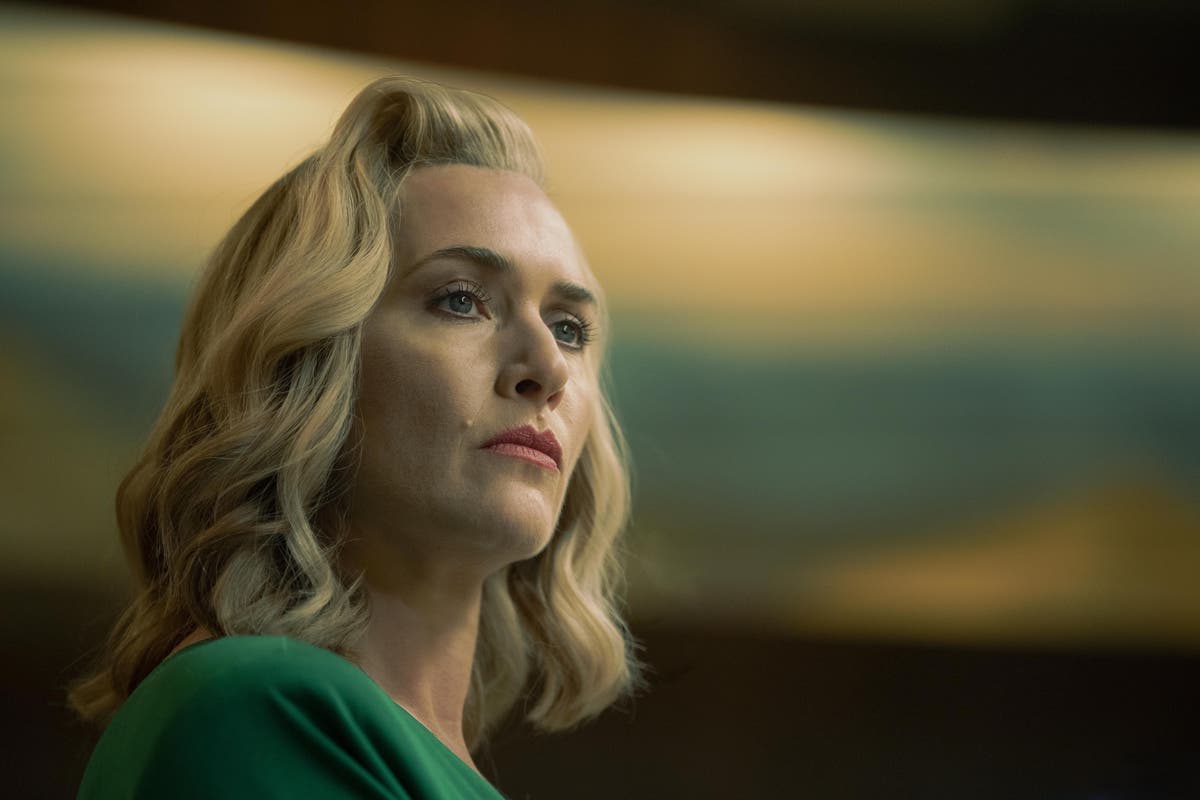“Never breathe in her direction, stay calm, don’t vomit.” This advice is dished out in hushed tones to anyone who enters the presence of Elena Vernham, the capricious, increasingly unstable “chancellor” of the unnamed nation, somewhere in “Middle Europe”, where Sky and HBO’s surreal comedy The Regime is set.
Vernham, played by an imperious Kate Winslet, boasts a set of intricately plaited blonde wigs, a wardrobe of colour-blocked power suits, a laissez-faire attitude to her citizens’ personal freedoms, a serious case of germophobia and some major daddy issues. She keeps her dead father’s decomposing body in a see-through coffin below the palace, like a nightmarish cross between Lenin’s Mausoleum and the glass case from Snow White and the Seven Dwarfs. Her dad was formerly a political player in a once-fringe right-wing party (there are obvious shades of Marine Le Pen here), but died of a lung infection. So as The Regime opens, Vernham is obsessively attempting to rid her presidential palace of the mould spores she is convinced will kill her.
Enter Herbert Zubak (Matthias Schoenaerts), a dead-eyed soldier nicknamed “The Butcher” thanks to his brutal quashing of a protest for better conditions at a mine (the country’s main export is cobalt, making it an attractive ally for nations willing to turn a blind eye to its dictatorial politics). His authoritarian streak catches Vernham’s eye, prompting her to give him a promotion – his new job is to follow her through the palace, uncovering mould by waving around a piece of humidity-monitoring tech, which looks like a massive metal detector. “It’s like a dog using a calculator,” one of the chancellor’s aides hisses.
Soon, Herbert and Elena (who is convinced she has already met the soldier in her dreams) are drawn into a symbiotic relationship, with the hypochondriac Elena buying into Herbert’s grunty workouts, dubious political initiatives and increasingly out-there natural cures – including a short-lived obsession with the healing power of potatoes, which are piled high in bowls around the palace.
If this all sounds pretty unhinged, that’s because, well, it is. The initial marketing for this six-episode series suggested it would sit somewhere between Armando Iannucci’s film The Death of Stalin, with its over-the-top characters and biting satire, and Succession: showrunner Will Tracy was on the writing team for Jesse Armstrong’s drama (he also co-wrote the 2022 movie The Menu, which starred Ralph Fiennes as a terrifying celebrity chef). But The Regime is a far stranger, more surreal creation, one that fully embraces absurdism. Thanks to the direction of Stephen Frears and Jessica Hobbs, it looks gorgeous, and the dissonant jolliness of the soundtrack from Alexandre Desplat (The Grand Budapest Hotel) reminds us that this is all meant to be a farce. All too often, though, The Regime feels like a jumble of big ideas that don’t really cohere.
After years of darker fare, like her previous HBO drama Mare of Easttown, Winslet is having a lot of fun with a totally daffy role – and it’s a joy to see. In her broadcasts to the nation, Elena addresses her public as “my loves”, with a drooping pout that sometimes lends her speech a lispy quality, one part petulant toddler, one part Julianne Moore in May December. She marks state occasions by performing Chicago’s 1976 power ballad “If You Leave Me Now”, complete with strange spoken-word asides, like the cruise ship act from hell. She also refuses to put salmon on the menu for said occasions, because “salmon is meek” – God knows what she’d make of veganism. And her party political broadcasts look like the filler videos that run between Eurovision performances. Straight-talking right-hand woman Agnes, played by Andrea Riseborough, observes all this with a slightly raised eyebrow and skewers her boss with blunt one-liners when she is out of the room.
Vernham’s fictional nation runs on the cult of personality – and her penchant for locking up her rivals, with Hugh Grant making a memorable appearance later in the series as a lefty former chancellor now imprisoned under the palace. But even Winslet’s star turn can’t keep the show afloat. The punchlines are all too rare: there are plenty of weird details that never quite add up to a full joke, and rely a little too heavily on zaniness and visual gags. Plus, the show can’t seem to work out exactly what it is trying to satirise, instead painting in broad strokes (Dictators are bad! Look at Elena sitting at the end of a ridiculously long table – she’s just like Putin!). Despite Winslet’s off-kilter charisma, it’s just not enough to have you pledging allegiance.

Sophie Anderson, a UK-based writer, is your guide to the latest trends, viral sensations, and internet phenomena. With a finger on the pulse of digital culture, she explores what’s trending across social media and pop culture, keeping readers in the know about the latest online sensations.








